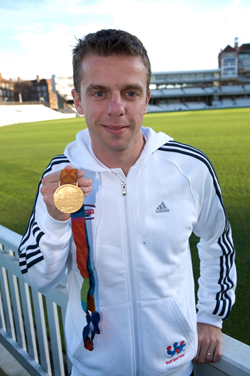When I am in schools running sessions with students, I discuss what nerves are like, the sensation of getting butterflies, moments of self doubt and all the feelings that the students may have but perhaps don’t realise are common to us all. I talk about how I get nervous before I race, before I speak in front of large groups and when I am trying something challenging for the first time. I also share how I have learned that nerves are good. They are my body’s way of telling me ‘this is important’ and ‘I am ready for the situation ahead’. I make sure nerves are a natural part of my preparations and I work with them, rather than letting them work against me.
A group of secondary school students may appear full of bravado and brimming with confidence on the surface, but underneath it is important to remember that everyone has their weaker spots. Encouraging students to react positively to their fears or moments of self doubt and learn how to overcome them, is one of the greatest gifts a teacher can impart.
Teaching students valuable life skills through practical activities works extremely well. I lead students in games where they can rehearse and test how mentally tough they are without the pressure of being in a real life situation. A good example of this is to run a series of target practice games when students shoot or throw something into a target under controlled conditions before repeating the same task in front of a group of cheering classmates. It’s incredible the difference that having the support of fellow students can bring to their final scores.
My biggest piece of advice to teachers in helping students learn how best to react under pressure is to be open and share their own experience of nerves, lacking confidence and pulling through to a positive resolution. I am very open with students about how my life changed when I lost my sight and both my negative and positive responses to that situation. I’m proud to now hold a Paralymic gold medal and hope sharing my story shows the students I meet that we all face challenges, changes and crossroads in our lives. Nothing is insurmountable and I believe strongly that by being strong and choosing to react positively to whatever comes our way, we can all become winners in life.
For myself, resilience comes from within - the Gold or the Black Box. I talk to students about putting away unhelpful past experiences like losing races, not being picked for a team, bad grades and getting into trouble in a Black Box inside their brains. In my running career I am at my best when I concentrate on the potential and opportunities that lay ahead in my Gold Box which is the future. I encourage students to adapt the same strategy, locking negative past experiences away in their Black Boxes and focussing on putting future goals that they can work towards in their own Gold Boxes.
By being positive, staying focused and drawing on their inner strengths, today’s students will be equipped with some of the main building blocks to success in life. I can’t promise every student isn’t going to face some hurdles along the way, but by knowing how to react positively to adverse situations, they can push through problems and ensure they have the right mentality to achieve whatever they set their minds to.


















